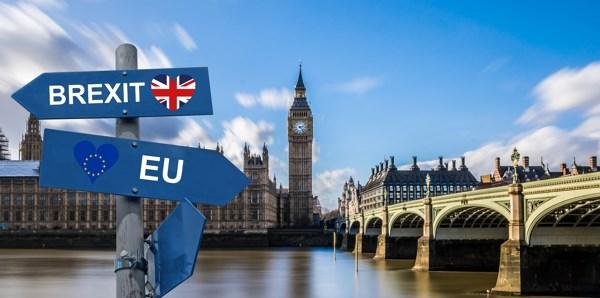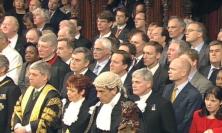
Having won yesterday’s no-confidence vote, Prime Minister Theresa May is holding cross-party talks to find a way forward on Brexit. If those discussions fail to produce a consensus, it may fall to the House of Commons as a whole to impose a plan. Joe Egerton suggests that the procedural reforms proposed by the sixteenth century Jesuit, Robert Parsons, could facilitate a process of conciliation.
Reflecting on the unprecedented defeat of the government on 15 January 2019 in The Times the following day,[1] Lord Finkelstein observed that positions on both sides of the Brexit divide had hardened since the referendum. The nation is now deeply divided, with no sign of how to re-unite.
The United Kingdom now finds itself in a predicament not dissimilar to that which the American historian Robert E. Rodes Jr[2] identified as facing Queen Mary and Queen Elizabeth in the sixteenth century after Henry VIII’s break with Rome had split his kingdom in two. Any sixteenth or early seventeenth century settlement of the religious question in England necessarily required that England either acknowledge or reject papal supremacy. Convinced Papists and convinced Protestants both formed factions too powerful to be ignored. To govern England effectively, it was necessary to enlist the support of one hard-line faction to overcome the other. The result was bloodshed.
Looking to the possibility of a change of religion on the death of Elizabeth I, the Jesuit Robert Parsons wrote a remarkable manuscript setting out a comprehensive programme for managing such a change without more blood being shed. It was eventually published in the reign of William and Mary under the title The Memorial on the Perfect Reformation of England.
The Memorial can in many ways be best understood as the precursor of the modern election manifesto – it set out a comprehensive programme for the reform of the English kingdom, embracing education, welfare and women’s rights. At the core was a proposal for the reform of the Commons.
Parsons saw parliament – and in particular the Commons – as central to his project:
For that the English Parliament, by old received custom of the Realm, is the Fountain, as it were, of all publick Laws, and settled Orders within the Land, one principal care is to be had that the high Court and Tribunal be well reformed...[3]
He was deeply concerned that members of a reformed House of Commons should be able to vote according to their judgment as to what would serve the common good. As Parsons knew well, both St Thomas Aquinas and St Ignatius Loyola regarded reason as the way to right choices, and the exercise of our reasoning facility requires us to consider the arguments for and against any particular choice. His proposals for proper debate and voting arrangements in the Commons must be seen in this context. According to Patrick Riordan SJ, the present dangerous state of affairs, ‘requires each Member of Parliament, each representative, to exercise judgment for the good of the whole.’[4] Exercise of judgment is the making of the choice of one course of action over another. If the House of Commons is to make final judgments it must be allowed to determine the questions before it and answer those questions with proper integrity.
Parsons set out to reverse the Tudor ascendancy over the Commons. While his predecessors had had immense problems with a cantankerous Commons, the first parliament of Henry VII became known as ‘the obedient parliament’. Queen Elizabeth I had taken good care to prevent the Commons debating church matters once they had approved her major legislation to impose uniformity of worship. Two specific proposals that Robert Parsons set out have resonance today as a resolution of the Brexit question is sought.
A Commons Committee to decide the agenda
The first is that the House of Commons, and not the crown (government), should determine its own procedures and in particular its allocation of time. Parsons proposed that the business of the House should be decided by a committee chaired by the Speaker. Four centuries later, on 12 November 2009, a Commons Committee chaired by Dr Tony Wright produced a near identical proposal in its report, Rebuilding the House. In 2010, the Coalition Agreement between the Conservative Party and the Liberal Democrats committed to a phased implementation of this proposal, the first stage being the creation of a Backbench Business Committee.[5] At the first debate organised by the new committee, the then Leader of the House, Sir George Young referred to Robert Parsons’ proposals,
My right hon. Friend the Member for East Yorkshire (Greg Knight) went a little further back in history to the Jesuit, Robert Parsons, to identify the source of the Backbench Business Committee. I do not want to prejudice the consensual nature of the debate by complaining too loudly of the last Government's failure to set up that Committee. It would be uncharitable to blame even the last Leader of the House for making slow progress on an idea that appears to have been some four centuries in the making.[6]
Despite the Coalition Agreement, a full business committee was not established. Commons business is still determined by the government, relying on Standing Order 14 which provides that, except in certain circumstances, ‘government business shall have precedence at every sitting’.[7]
Who decides the Commons’ agenda is now a central issue. As Patrick Riordan observed, any solution to the Brexit question will have to be imposed by majority voting if (as is the case) no consensus is possible:
This is what can be said in support of the practice: majority rule is a means of reaching a conclusion in the context of persistent disagreement. It is wise to recognise this very practical context for these central institutions of elections and parliamentary votes in our current form of government.[8]
But voting cannot take place without a question being put, and procedure thus becomes crucial to any political structure in which voting takes place.
Secret voting in the Commons
Parsons also recognised the importance of protecting MPs from pressure, and as such he proposed that MPs voted as Venetian senators – by casting a coloured ball in secret.
A number of MPs have suggested that key votes should be free, that is to say, MPs should not be ‘whipped’. That would mean that should an MP vote against their party, the chief whip could not suspend the MP’s party membership, thus making it impossible for that MP to stand as a party candidate in another election. When the House of Commons approved in principle Edward Heath’s proposals for entry into the EEC on 28 October 1971, Conservative (although not Labour) MPs had a free vote.[9]
A free vote would not address the pressure that is put on MPs from their constituency parties. Secret voting on legislation could achieve this but would be a very substantial change in procedure indeed. It would substantially diminish the power of the party. When, each week, the parties send out a ‘whip’, in theory it is no more than a summons to be present for a vote; the reality is that it is a summons to vote in a certain way. Robert Parsons’ reform would not eliminate the whipping system, but it would mean that the whip was what it said it was: a summons to attend.
The way in which the party system is contributing to the failure to resolve the Brexit question may make some such change necessary.
Patrick Riordan quoted Edmund Burke: ‘Your representative owes you, not his industry only, but his judgment…’ and added a gloss: ‘To form judgments based on reasons is the task of the legislator and the legislative assembly’ (emphasis added).[10] This might at first sight imply that reason, not party, should prevail. But Burke was one of the two great theorists of the party as means of organising votes in parliament to implement a programme based on principle. It was this that gave the Rockingham Whigs, for whom Burke was the chief theoretician, the claim to be the first modern political party.
The other great theorist was Benjamin Disraeli, a great admirer of Edmund Burke – Disraeli was to claim that Burke effected for the Whigs what Bolingbroke in a preceding age had done for the Tories: he restored the moral existence of the party. In his great speech in the Free Trade Hall in Manchester in 1872, Disraeli told his audience: ‘I am a party man. I believe that, without party, Parliamentary government is impossible.’
However, Disraeli shared with Burke an unwavering belief that principle, not self-interest, was the only proper foundation of any party that deserved the name. The theme of Disraeli’s novel, Coningsby, is the importance of principle as a foundation of party. This is the root of his conflict with Sir Robert Peel: Disraeli expressly denounces Peel’s Tamworth Manifesto for creating a party without principle. In 1846, in the Commons, attacking Peel for reneging on the election manifesto pledge to maintain the Corn Laws, he warned: ‘it is only by maintaining the independence of party that you can maintain the integrity of public men and the power and influence of parliament itself.’
Disraeli and Burke belonged to the same tradition as Robert Parsons. Burke’s contemporary critics made precisely this allegation – he was, one alleged, a product of the Jesuit college of St Omers (he was not) founded by Parsons in 1592. [11] Cartoonists portrayed him as a Jesuit, in an era in which Robert Parsons was, in Evelyn Waugh’s phrase, ‘the sinister Jesuit of popular imagination’. Disraeli’s Coningsby and Sybil draw heavily on The Memorial and on Parsons’ earlier work, The Conference on the Next Succession. Indeed, the character of Rebello in Coningsby seems to be based on Parsons.
While the idea of MPs voting secretly would undoubtedly reduce the power of the whips, it is by no means certain that it prevents the operation of party as organised principle. The good arguments for party advanced by Burke and Disraeli are advanced by thinkers who were entirely clear that party must not be a vehicle for obtaining the fruits of office for the benefit of those who gain office, but for the implementation of policies based on principle. That requires space for MPs to exercise judgment based on reason. Disraeli may have been right or wrong to attribute to Peel a lack of principle, but there is no doubt that Disraeli’s critique of Peel was that he had abandoned the principles not just on which he had led his party to electoral victory, but which should have underpinned any Tory administration.
A framework for reconciliation
It is increasingly clear that a failure to find an answer to the question of our relationship with our closest neighbours for generations to come will have very negative consequences. This is the central message of the recent speech of the Archbishop of Canterbury in the House of Lords on 9 January 2019. As the archbishop said, parliament – in particular the House of Commons – has to address the risk of ‘not only a political and practical failure, but a moral one’. [12]
The English Civil War followed the ‘political and practical failure’ of crown (government) and parliament to resolve the questions posed by a widening divide over the religious and political structures that determined how the people of the Stuart kingdoms should be governed and should worship. Events in parliament could not have taken the course they did in the two years prior to Charles I fleeing his capital in January 1642 if, in 1603, James I had adopted Robert Parsons’ proposals for the reform of the procedure of the Commons.[13] While history rarely repeats itself precisely, Mr Chris Grayling makes a serious point when he refers to the violence of earlier centuries and the dangers of recurrence if parliament fails to find answers to the questions posed by Brexit that are respected even if not liked. Robert Parsons offered two proposals that might help the House of Commons produce answers that are widely accepted.
Joe Egerton has written on Robert Parsons and parliamentary procedure for Thinking Faith. He advised MPs on procedural matters during the 1976/77 debates on devolution and the Maastricht debates.
[1] Daniel Finkelstein, ‘Blame the Brexiteers for last night’s farce’, The Times, 16 January 2019: https://www.thetimes.co.uk/article/blame-the-brexiteers-for-last-night-s-farce-2hk5l262f
[2] Robert E. Rodes Jr.’s Lay Authority in the English Church is a useful reference work on the role of the common law in implementing the English reformation.
[3] Robert Parsons SJ, The Memorial on the Perfect Reformation of England, Chapter X.
[4] Patrick Riordan SJ, ‘The Will of the People?’, Thinking Faith, 14 January 2019: https://www.thinkingfaith.org/articles/will-people
[5] Joe Egerton, ‘Commons reform: From Robert Parsons to Tony Wright’, Thinking Faith, 17 February 2010: https://www.thinkingfaith.org/articles/20100217_1.htm
[6] Hansard, 20 July 2010, col 262: https://publications.parliament.uk/pa/cm201011/cmhansrd/cm100720/debtext/100720-0003.htm
[7] ‘Standing Orders of the House of Commons - Public Business 2012’, §14: https://publications.parliament.uk/pa/cm201213/cmstords/614/body.htm
[8] Patrick Riordan SJ, op.cit.
[9] 69 Labour MPs, led by Roy Jenkins and Dick Taverne, defied the Labour Whip. David Wood, the political editor of The Times, famously accosted the Labour leader afterwards: ‘69 Labour MPs voted according to their conscience.’ Harold Wilson replied: ‘I can promise you it will not happen again.’
[10] Patrick Riordan SJ, op.cit.
[11] After several moves, the college settled in Lancashire in 1794 as Stonyhurst College.
[12] Archbishop Justin Welby, Speech in Lords Brexit debate, 9 January 2019: https://www.archbishopofcanterbury.org/speaking-and-writing/speeches/archbishop-justin-welbys-speech-lords-brexit-debate
[13] For a detailed account of events from May 1640 to January 1642, see John Adamson, The Noble Revolt: The overthrow of Charles I (Weidenfeld & Nicholson, 2007).





